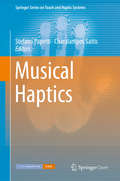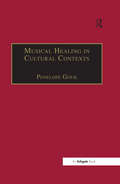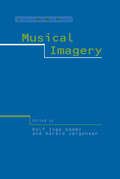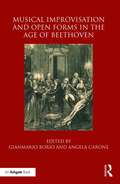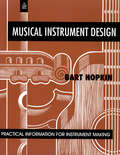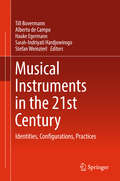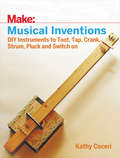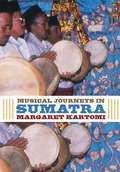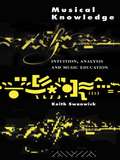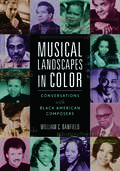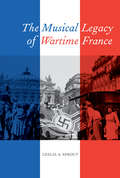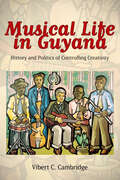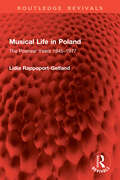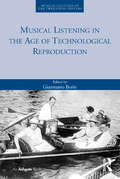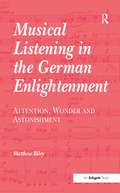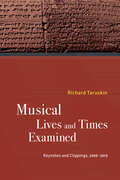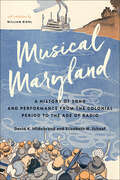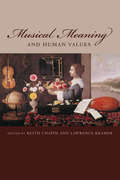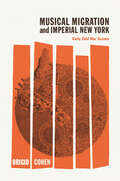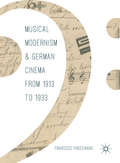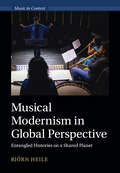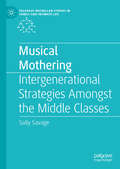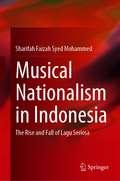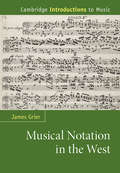- Table View
- List View
Musical Haptics (Springer Series on Touch and Haptic Systems)
by Stefano Papetti Charalampos SaitisThis open access book offers an original interdisciplinary overview of the role of haptic feedback in musical interaction. Divided into two parts, part I examines the tactile aspects of music performance and perception, discussing how they affect user experience and performance in terms of usability, functionality and perceived quality of musical instruments. Part II presents engineering, computational, and design approaches and guidelines that have been applied to render and exploit haptic feedback in digital musical interfaces. Musical Haptics introduces an emerging field that brings together engineering, human-computer interaction, applied psychology, musical aesthetics, and music performance. The latter, defined as the complex system of sensory-motor interactions between musicians and their instruments, presents a well-defined framework in which to study basic psychophysical, perceptual, and biomechanical aspects of touch, all of which will inform the design of haptic musical interfaces. Tactile and proprioceptive cues enable embodied interaction and inform sophisticated control strategies that allow skilled musicians to achieve high performance and expressivity. The use of haptic feedback in digital musical interfaces is expected to enhance user experience and performance, improve accessibility for disabled persons, and provide an effective means for musical tuition and guidance.
Musical Healing in Cultural Contexts
by Penelope GoukHow do people use music to heal themselves and others? Are the healing powers of music universal or culturally specific? The essays in this volume address these two central questions as to music‘s potential as a therapeutic source. The contributors approach the study of music healing from social, cultural and historical backgrounds, and in so doing provide perspectives on the subject which complement the wealth of existing literature by practitioners. The forms of music therapy explored in the book exemplify the well-being that can be experienced as a result of participating in any type of musical or artistic performance. Case studies include examples from the Bolivian Andes, Africa and Western Europe, as well as an assessment of the role of Islamic traditions in Western practices. These case studies introduce some new, and possibly unfamiliar models of musical healing to music therapists, ethnomusicologists and anthropologists. The book contributes to our understanding of the transformative and healing roles that music plays in different societies, and so enables us better to understand the important part music contributes to our own cultures.
Musical Imagery
by Harald Jørgensen Rolf Inge Godøy, Rolf IngeAn edited collection of papers which explore a large number of topics related to musical imagery. Musical imagery can be defined as our mental capacity for imagining sound in the absence of a directly-audible sound source, meaning that we can recall and re-experience or even invent new musical sound through our inner ear. The first part of the volume is focused on theoretical issues such as the history, epistemology, neurological bases, and cognitive models of musical imagery. The second part presents various applications of musical imagery in performance and composition, and provides the reader with a broad overview of the many musical activities which are concerned with musical imagery.;Musical imagery is a truly interdisciplinary subject, and it is the belief of the editors that a plurality of approaches, ranging from the introspective and philosophical to the experimental and computational, is the most fruitful strategy for exploring the subject of musical imagery.
Musical Improvisation and Open Forms in the Age of Beethoven
by Gianmario Borio Angela CaroneImprovisation was a crucial aspect of musical life in Europe from the late eighteenth century through to the middle of the nineteenth, representing a central moment in both public occasions and the private lives of many artists. Composers dedicated themselves to this practice at length while formulating the musical ideas later found at the core of their published works; improvisation was thus closely linked to composition itself. The full extent of this relation can be inferred from both private documents and reviews of concerts featuring improvisations, while these texts also inform us that composers quite often performed in public as both improvisers and interpreters of pieces written by themselves or others. Improvisations presented in concert were distinguished by a remarkable degree of structural organisation and complexity, demonstrating performers’ consolidated abilities in composition as well as their familiarity with the rules for improvising outlined by theoreticians.
Musical Instrument Design: Practical Information for Instrument Making (Sound Design Ser.)
by Bart Hopkin John ScovilleThis is an encyclopedic, large-format book containing hundreds of illustrations. While not geared toward making conventional instruments, Musical Instrument Design provides all the information that anyone (amateur or professional) should ever need to construct an amazingly wide variety of percussion, string, and wind instruments. Includes many designs along with parts lists and detailed construction instructions.
Musical Instruments in the 21st Century
by Till Bovermann Alberto De Campo Hauke Egermann Sarah-Indriyati Hardjowirogo Stefan WeinzierlBy exploring the many different types and forms of contemporary musical instruments, this book contributes to a better understanding of the conditions of instrumentality in the 21st century. Providing insights from science, humanities and the arts, authors from a wide range of disciplines discuss the following questions: #65533; What are the conditions under which an object is recognized as a musical instrument? #65533; What are the actions and procedures typically associated with musical instruments? #65533; What kind of (mental and physical) knowledge do we access in order to recognize or use something as a musical instrument? #65533; How is this knowledge being shaped by cultural conventions and temporal conditions? #65533; How do algorithmic processes 'change the game' of musical performance, and as a result, how do they affect notions of instrumentality? #65533; How do we address the question of instrumental identity within an instrument's design process? #65533; What properties can be used to differentiate successful and unsuccessful instruments? Do these properties also contribute to the instrumentality of an object in general? What does success mean within an artistic, commercial, technological, or scientific context?
Musical Inventions: DIY Instruments to Toot, Tap, Crank, Strum, Pluck, and Switch On
by Kathy CeceriPeople have been playing music on homemade instruments for thousands of years. But creating new instruments is much more than an art form. When you want to make a note sound higher or lower, you have to change the sound waves coming out of the instrument. That's science! When you explore the way different materials produce different sounds, that's engineering. When you speed up or slow down a song, you're counting beats -- using math. And technology makes electronic instruments and devices to record and play back music possible.
Musical Journeys in Sumatra
by Margaret KartomiDespite being the sixth largest island in the world and home to an estimated 44 million Indonesians, Sumatra's musical arts and cultures have not been the subject of a book-length study until now. Documenting and explaining the ethnographic, cultural, and historical contexts of Sumatra's performing arts, Musical Journeys in Sumatra also traces the changes in their style, content, and reception from the early 1970s onward. Having dedicated thirty years of scholarship to exploring the rich and varied music of Sumatran provinces, Margaret Kartomi provides a fascinating ethnographic record of vanishing musical genres, traditions, and practices that have become deeply compromised by the pressures of urbanization, rural poverty, and government policy in. This unique collection showcases the complex diversity of Indonesian music and includes field observations from five different provinces: Aceh, North Sumatra, Riau, West Sumatra, and South Sumatra. Featuring unique photographs and original drawings from Kartomi's field observations of instruments and performances, Musical Journeys in Sumatra provides a comprehensive musical introduction to this neglected, very large island, with its hundreds of ethno-linguistic-musical groups.
Musical Knowledge: Intuition, analysis and music education
by Keith Swanwick Prof Keith SwanwickThe understanding of music involves the mastery of its various layers of meaning. Sometimes this meaning can be acquired through human insight; at other times, it can be learned. The central concern of Musical Knowledge is the tension between intuitive and analytical ways of making sense of the world. Keith Swanwick examines this relationship on three levels: in considering music as a way of knowing; as the apparent predicament between qualitative and quantitative research paradigms; and as a tension in education. Keith Swanwick guides his reader from a theoretical exploration of musical knowledge, through an examination of ways of researching the musical experience to a concluding section which will be of direct practical help to teachers. He suggests ways in which music education can be a vital transaction, giving examples across a range of music teaching, including school classroom and instrumental studios. The book will be of interest to anyone who makes or responds to music.
Musical Landscapes in Color: Conversations with Black American Composers (Music in American Life)
by William C. BanfieldNow available in paperback, William C. Banfield’s acclaimed collection of interviews delves into the lives and work of forty-one Black composers. Each of the profiled artists offers a candid self-portrait that explores areas from training and compositional techniques to working in a exclusive canon that has existed for a very long time. At the same time, Banfield draws on sociology, Western concepts of art and taste, and vernacular musical forms like blues and jazz to provide a frame for the artists’ achievements and help to illuminate the ongoing progress and struggles against industry barriers. Expanded illustrations and a new preface by the author provide invaluable added context, making this new edition an essential companion for anyone interested in Black composers or contemporary classical music. Composers featured: Michael Abels, H. Leslie Adams, Lettie Beckon Alston, Thomas J. Anderson, Dwight Andrews, Regina Harris Baiocchi, David Baker, William C. Banfield, Ysaye Maria Barnwell, Billy Childs, Noel DaCosta, Anthony Davis, George Duke, Leslie Dunner, Donal Fox, Adolphus Hailstork, Jester Hairston, Herbie Hancock, Jonathan Holland, Anthony Kelley, Wendell Logan, Bobby McFerrin, Dorothy Rudd Moore, Jeffrey Mumford, Gary Powell Nash, Stephen Newby, Coleridge-Taylor Perkinson, Michael Powell, Patrice Rushen, George Russell, Kevin Scott, Evelyn Simpson-Curenton, Hale Smith, Billy Taylor, Frederick C. Tillis, George Walker, James Kimo Williams, Julius Williams, Tony Williams, Olly Wilson, and Michael Woods
Musical Legacy of Wartime France
by Leslie A. SproutFor the three forces competing for political authority in France during World War II, music became the site of a cultural battle that reflected the war itself. German occupying authorities promoted German music at the expense of French, while the Vichy administration pursued projects of national renewal through culture. Meanwhile, Resistance networks gradually formed to combat German propaganda while eyeing Vichy's efforts with suspicion. In The Musical Legacy of Wartime France, Leslie A. Sprout explores how each of these forces influenced the composition, performance, and reception of five well-known works: the secret Resistance songs of Francis Poulenc and those of Arthur Honegger; Olivier Messiaen's Quartet for the End of Time, composed in a German prisoner of war camp; Maurice Duruflé's Requiem, one of sixty-five pieces commissioned by Vichy between 1940 and 1944; and Igor Stravinsky's Danses concertantes, which was met at its 1945 Paris premiere with protests that prefigured the aesthetic debates of the early Cold War. Sprout examines not only how these pieces were created and disseminated during and just after the war, but also how and why we still associate these pieces with the stories we tell--in textbooks, program notes, liner notes, historical monographs, and biographies--about music, France, and World War II.
Musical Life in Guyana: History and Politics of Controlling Creativity (Caribbean Studies Series)
by Vibert C. CambridgeMusical Life in Guyana is the first in-depth study of Guyanese musical life. It is also a richly detailed description of the social, economic, and political conditions that have encouraged and sometimes discouraged musical and cultural creativity in Guyana. The book contributes to the study of the interactions between the policies and practices by national governments and musical communities in the Caribbean. Vibert C. Cambridge explores these interactions in Guyana during the three political eras that the society experienced as it moved from being a British colony to an independent nation. The first era to be considered is the period of mature colonial governance, guided by the dictates of “new imperialism,” which extended from 1900 to 1953. The second era, the period of internal self-government and the preparation for independence, extends from 1953, the year of the first general elections under universal adult suffrage, to 1966, the year when the colony gained its political independence. The third phase, 1966 to 2000, describes the early postcolonial era. Cambridge reveals how the issues of race, class, gender, and ideology deeply influenced who in Guyanese multicultural society obtained access to musical instruction and media outlets and thus who received recognition. He also describes the close connections between Guyanese musicians and Caribbean artists from throughout the region and traces the exodus of Guyanese musicians to the great cities of the world, a theme often neglected in Caribbean studies. The book concludes that the practices of governance across the twentieth century exerted disproportionate influence in the creation, production, distribution, and consumption of music.
Musical Life in Poland: The Postwar Years 1945–1977 (Routledge Revivals)
by Lidia Rappoport-GelfandNever in the history of Polish music has there been a period like the one that followed World War II. No other era has given the world so many outstanding composers and so many talented works in all kinds of musical genres. Polish music asserted itself on the world scene as independent, distinct, and creatively important phenomenon.First published in English in 1991, Musical Life in Poland outlines the general trends of the evolution of postwar music in Poland by periods. The author discusses in detail the specifics of national traditions of Polish culture and art, beginning with the purely Polish romantic and expressive tradition and ending with the powerful influence of Catholicism on art. She introduces a large group of talented composers and their artistically valuable works to the English-speaking reader and comprehensively covers musical culture in Poland.
Musical Listening in the Age of Technological Reproduction (Musical Cultures of the Twentieth Century)
by Gianmario BorioIt is undeniable that technology has made a tangible impact on the nature of musical listening. The new media have changed our relationship with music in a myriad of ways, not least because the experience of listening can now be prolonged at will and repeated at any time and in any space. Moreover, among the more striking social phenomena ushered in by the technological revolution, one cannot fail to mention music’s current status as a commodity and popular music’s unprecedented global reach. In response to these new social and perceptual conditions, the act of listening has diversified into a wide range of patterns of behaviour which seem to resist any attempt at unification. Concentrated listening, the form of musical reception fostered by Western art music, now appears to be but one of the many ways in which audiences respond to organized sound. Cinema, for example, has developed specific ways of combining images and sounds; and, more recently, digital technology has redefined the standard forms of mass communication. Information is aestheticized, and music in turn is incorporated into pre-existing symbolic fields. This volume - the first in the series Musical Cultures of the Twentieth Century - offers a wide-ranging exploration of the relations between sound, technology and listening practices, considered from the complementary perspectives of art music and popular music, music theatre and multimedia, composition and performance, ethnographic and anthropological research.
Musical Listening in the German Enlightenment: Attention, Wonder and Astonishment
by Matthew RileyThe silent attentiveness expected of concert audiences is one of the most distinctive characteristics of modern Western musical culture. This is the first book to examine the concept of attention in the history of musical thought and its foundations in the writings of German musical commentators of the late eighteenth century. Those critics explained numerous technical features of the music of their time as devices for arousing, sustaining or otherwise influencing the attention of a listener, citing in illustration works by Gluck, C. P. E. Bach, Georg Benda and others. Two types of attention were identified: the uninterrupted experience of a single emotional state conveyed by a piece of music as a whole, and the fleeting sense of 'wonder' or 'astonishment' induced by a local event in a piece. The relative validity of these two modes was a topic of heated debate in the German Enlightenment, encompassing issues of musical communication, compositional integrity and listener competence. Matthew Riley examines the significant writers on the topic (Descartes, Leibniz, Wolff, Baumgarten, Rousseau, Meier, Sulzer and Forkel) and provides analytical case studies to illustrate how these perceived modes of attention shaped interpretations of music of the period.
Musical Lives and Times Examined: Keynotes and Clippings, 2006–2019
by Richard TaruskinIn this new and final collection, Richard Taruskin gathers a sweeping range of keynote speeches, reviews, and critical essays from the first twenty years of the twenty-first century. With twenty-three essays in total, this volume presents five lectures delivered in Budapest on Hungarian music and ten essays on Russian music. Reviews of contemporary work in musicology and reflections on the place of music in society showcase Taruskin’s trademark wit and breadth. Musical Lives and Times Examined is an essential collection, a comprehensive portrait of a distinguished figure in music studies, illuminating the ideas that have transformed the discipline and will continue to do so.
Musical Maryland: A History of Song and Performance from the Colonial Period to the Age of Radio
by David K. Hildebrand Elizabeth M. SchaafThe only book to delve deeply into Maryland’s rich musical performance history and the people who created it.In Musical Maryland, the first comprehensive survey of the music emanating from the Old Line State, David K. Hildebrand and Elizabeth M. Schaaf explore the myriad ways in which music has enriched the lives of Marylanders. From the drinking songs of colonial Annapolis, the liturgical music of the Zion Lutheran Church, and the work songs of the tobacco fields to the exuberant marches of late nineteenth-century Baltimore Orioles festivals, Chick Webb’s mastery on drums, and the triumphs of the Baltimore Opera Society, this richly illustrated volume explores more than 300 years of Maryland’s music history.Beginning with early compositions performed in private settings and in public concerts, this book touches on the development of music clubs like the Tuesday Club, the Florestan Society, and H. L. Mencken’s Saturday Night Club, as well as lasting institutions such as the Peabody Institute and the Baltimore Symphony Orchestra (BSO). Yet the soundscape also includes militia quicksteps, sea chanteys, and other work songs. The book describes the writing of "The Star-Spangled Banner"—perhaps Maryland's single greatest contribution to the nation's musical history. It chronicles the wide range of music created and performed by Maryland’s African American musicians along Pennsylvania Avenue in racially segregated Baltimore, from jazz to symphonic works. It also tells the true story of a deliberately integrated concert that the BSO staged at the end of World War II. The book is full of musical examples, engravings, paintings, drawings, and historic photographs that not only portray the composers and performers but also the places around the state in which music flourished. Illuminating sidebars by William Biehl focus on late nineteenth- and early twentieth-century song of the kind evoked by the USS Baltimore or inspired by the state's history, natural beauty, and romantic steamboats. The book also offers a sampling of the tunes that Maryland’s more remarkable composers and performers, including Billie Holiday, Eubie Blake, and Cab Calloway, contributed to American music before the homogenization that arrived in earnest after World War II.Bringing to life not only portraits of musicians, composers, and conductors whose stories and recollections are woven into the fabric of this book, but also musical scores and concert halls, Musical Maryland is an engaging, authoritative, and bold look at an endlessly compelling subject.
Musical Meaning and Human Values
by Lawrence Kramer Keith ChapinMusical understanding has evolved dramatically in recent years, principally through a heightened appreciation of musical meaning in its social, cultural, and philosophical dimensions. This collection of essays by leading scholars addresses an aspect of meaning that has not yet received its due: the relation of meaning in this broad humanistic sense to the shaping of fundamental values. The volume examines the open and active circle between the values and valuations placed on music by both individuals and societies, and the discovery, through music, of what and how to value.With a combination of cultural criticism and close readings of musical works, the contributors demonstrate repeatedly that to make music is also to make value, in every sense. They give particular attention to values that have historically enabled music to assume a formative role in human societies: to foster practices of contemplation, fantasy, and irony; to explore sexuality, subjectivity, and the uncanny; and to articulate longings for unity with nature and for moral certainty. Each essay in the collection shows, in its own way, how music may provoke transformative reflection in its listeners and thus help guide humanity to its own essential embodiment in the world.The range of topics is broad and developed with an eye both to the historical specificity of values and to the variety of their possible incarnations. The music is both canonical and noncanonical, old and new. Although all of it is “classical,” the contributors’ treatment of it yields conclusions that apply well beyond the classical sphere. The composers discussed include Gabrieli, Marenzio, Haydn, Beethoven, Mendelssohn, Brahms, Wagner, Puccini, Hindemith, Schreker, and Henze.Anyone interested in music as it is studied today will find this volume essential reading.
Musical Migration and Imperial New York: Early Cold War Scenes (New Material Histories of Music)
by Brigid CohenThrough archival work and storytelling, Musical Migration and Imperial New York revises many inherited narratives about experimental music and art in postwar New York. From the urban street level of music clubs and arts institutions to the world-making routes of global migration and exchange, this book redraws the map of experimental art to reveal the imperial dynamics and citizenship struggles that continue to shape music in the United States. Beginning with the material conditions of power that structured the cityscape of New York in the early Cold War years, Brigid Cohen looks at a wide range of artistic practices (concert music, electronic music, jazz, performance art) and actors (Edgard Varèse, Charles Mingus, Yoko Ono, and Fluxus founder George Maciunas) as they experimented with new modes of creativity. Cohen links them with other migrant creators vital to the city’s postwar culture boom, creators whose stories have seldom been told (Halim El-Dabh, Michiko Toyama, Vladimir Ussachevsky). She also gives sustained and serious treatment to the work of Yoko Ono, something long overdue in music scholarship. Musical Migration and Imperial New York is indispensable reading, offering a new understanding of global avant-gardes and American experimental music as well as the contrasting feelings of belonging and exclusion on which they were built.
Musical Migration and Imperial New York: Early Cold War Scenes (New Material Histories of Music)
by Brigid CohenThrough archival work and storytelling, Musical Migration and Imperial New York revises many inherited narratives about experimental music and art in postwar New York. From the urban street level of music clubs and arts institutions to the world-making routes of global migration and exchange, this book redraws the map of experimental art to reveal the imperial dynamics and citizenship struggles that continue to shape music in the United States. Beginning with the material conditions of power that structured the cityscape of New York in the early Cold War years, Brigid Cohen looks at a wide range of artistic practices (concert music, electronic music, jazz, performance art) and actors (Edgard Varèse, Charles Mingus, Yoko Ono, and Fluxus founder George Maciunas) as they experimented with new modes of creativity. Cohen links them with other migrant creators vital to the city’s postwar culture boom, creators whose stories have seldom been told (Halim El-Dabh, Michiko Toyama, Vladimir Ussachevsky). She also gives sustained and serious treatment to the work of Yoko Ono, something long overdue in music scholarship. Musical Migration and Imperial New York is indispensable reading, offering a new understanding of global avant-gardes and American experimental music as well as the contrasting feelings of belonging and exclusion on which they were built.
Musical Modernism and German Cinema from 1913 to 1933
by Francesco FinocchiaroThis book investigates the relationship between musical Modernism and German cinema. It paves the way for anunorthodox path of research, one which has been little explored up until now. The main figures of musical Modernism, from Alban Berg to Paul Hindemith, and from Richard Strauss to Kurt Weill, actually had a significant relationship with cinema. True, it was a complex and contradictory relationship in which cinema often emerged more as an aesthetic point of reference than an objective reality; nonetheless, the reception of the language and aesthetic of cinema had significant influence on the domain of music. Between 1913 and 1933, Modernist composers' exploration of cinema reached such a degree of pervasiveness and consistency as to become a true aesthetic paradigm, a paradigm that sat at the very heart of the Modernist project. In this insightful volume, Finocchiaro shows that the creative confrontation with the avant-garde medium par excellence can be regarded as a vector of musical Modernism: a new aesthetic paradigm for the very process - of deliberate misinterpretation, creative revisionism, and sometimes even intentional subversion of the Classic-Romantic tradition - which realized the "dream of Otherness" of the Modernist generation.
Musical Modernism in Global Perspective: Entangled Histories on a Shared Planet (Music in Context)
by Björn HeileIn the first study of the global dimensions of musical modernism, Björn Heile proposes a novel theory according to which musical modernism is constituted by a global diasporic network of composers, musicians and institutions. In a series of historical and analytical case studies from different parts of the world, this book overcomes the respective limitations of both Eurocentric and postcolonial, revisionist accounts, focusing instead on the transnational entanglements between the West and other world regions. Key topics include migration, the transnational reception and transfer of musical works and ideas, institutions such as the International Society for Contemporary Music (ISCM) and composers who are rarely discussed in Western academia, such as the Nigerian-born Akin Euba and the Korean-German Younghi Pagh-Paan. Influenced by the interdisciplinary notion of 'entangled histories', Heile critiques established dichotomies, all the while highlighting the unequal power relations on which the existing global order is founded.
Musical Mothering: Intergenerational Strategies Amongst the Middle Classes (Palgrave Macmillan Studies in Family and Intimate Life)
by Sally SavageThis book examines how gender and class discourses shape 'musical mothering' by incorporating knowledges from sociology, psychology, cultural studies, and education. Chapters detail the fundamental and functional role that mothers play in children's musical development alongside children's agency in influencing familial experiences. Music plays an essential role in the lives of mothers for themselves. Through interviews with mothers and grandmothers, as well as the author's own autobiographical reflections, the author offers a unique interdisciplinary approach to motherhood and music within Australian culture.
Musical Nationalism in Indonesia: The Rise and Fall of Lagu Seriosa
by Sharifah Faizah MohammedThis book charts the growth of the Indonesian nationalistic musical genre of lagu seriosa in relation to the archipelago's history in the 1950s and 1960s, examining how folk songs were implemented as a valuable tool for promoting government propaganda. The author reveals how the genre was shaped to fit state ideologies and agendas in the Sukarno and Soeharto eras. It also reveals the very significant role played by Radio Republik Indonesia in the genre’s development and dissemination. Little research has been done to investigate how Indonesian music contributed to nation-building during Indonesia’s immediate post-colonial period. Emulating the European art song, the genre was adapted to compose songs with the purpose of promoting a strengthened collective Indonesian identity, fostered by a group of musicians who functioned as gatekeepers, monitoring and devising various mechanisms for songs to conform to the propagandistic needs of the Indonesian government at the time. The result was the development of classical style of singing and the cultivation of a patriotic collection of music during the Guided Democracy period (1959–1965), which peaked at the height of the Konfrontasi (1963–1966). Lagu seriosa lost popularity as popular music infiltrated Indonesia in the 1970s, but it remains an iconic yet understudied aspect of the nationalistic agenda in Indonesia. The case studies of selected songs reflected continuity and change in musical style and over time. This book is of interest to scholars studying the intersection between history, politics, identity, arts and cultural studies in Indonesia. It is also of interest to researchers investigating the role of music in identity formation and nation-building more widely.
Musical Notation in the West (Cambridge Introductions to Music)
by James GrierMusical notation is a powerful system of communication between musicians, using sophisticated symbolic, primarily non-verbal means to express musical events in visual symbols. Many musicians take the system for granted, having internalized it and their strategies for reading it and translating it into sound over long years of study and practice. This book traces the development of that system by combining chronological and thematic approaches to show the historical and musical context in which these developments took place. Simultaneously, the book considers the way in which this symbolic language communicates to those literate in it, discussing how its features facilitate or hinder fluent comprehension in the real-time environment of performance. Moreover, the topic of musical as opposed to notational innovation forms another thread of the treatment, as the author investigates instances where musical developments stimulated notational attributes, or notational innovations made practicable advances in musical style.
